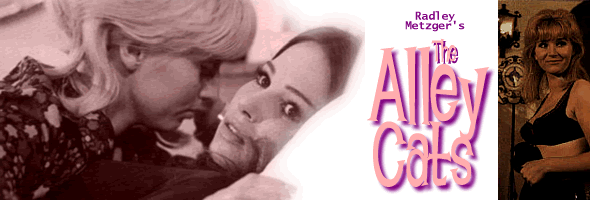

B&W, 1966, 83 mins. Directed by Radley Metzger
Starring Anne Arthur, Karin Field, Sabrina Koch, Harald Baerow, Charlie Hickman, Uta Levka / Written by Peter Fernandez / Cinematography by Hans Jura
Format: DVD - Image / First Run Features (MSRP $24.95)
Letterboxed (2.35:1) / Dolby Digital Mono
Leslie (Anne Arthur), a lovely young society girl, is engaged to the seemingly straight-laced Logan (Charlie Hickman). However, Logan's carrying on Sporting one of Metzger's most physically appealing casts, The Alley Cats takes expert advantage of Hans Jura's widescreen compositions and velvety black and white cinematography. Arthur is just as gorgeous and appealing as any of Metzger's future female protagonists, and the supporting cast all looks appropriately well-groomed and enthusiastic. That future Carmen, Baby, Uta Levka, even turns up in a supporting role as one of the wanton young women. The DVD looks comparable to the other Metzger transfers from First Run: accurate letterboxing, fine image quality, slightly worn print, and elegant menu design. Considering the rarity of this particular title (the only light "erotica" release not issued in any form before First Run's line of Metzger releases), the presentation is definitely acceptable and better than many other black and white titles released so far on DVD. As with many Euro features of the day, the trailer incorporates several photos and saucy snippets of footage rejected from the final cut of the film; in fact, this particular trailer contains far more nudity and kinkiness than the film itself.
B&W, 1957, 95 mins. Directed by Radley Metzger and William Kyriakis
Starring Athan Karras, Jeanne Jerems, Rosemary Torri, David Hooks, Edward Brazier / Music by Laurence Rosenthal / Cinematography by Peter Erik Winkler
Format: DVD - Image / First Run Features (MSRP $24.95) Full Frame / Dolby Digital Mono
Yianni Martakis (Karras), a sailor immigrant in New York, is on a mission to find and kill the man who raped his sister. Along the way he becomes entangled with the sweet, unassuming Niki Vassos (Jerrems), and must decide whether he should forget his path of vengeance and perhaps begin living a normal life. Beyond the simple eye for an eye plot, however, is an interesting look at Greek culture in New York circa the late '50s, with a heavy emphasis on family dynamics. While this isn't really a sensual film (except in perhaps a twisted Tennessee Williams kind of way), the clashes of rugged masculinity and fiery femininity make for some unusual interactions here. Karras in particular gives an effective performance, deliberately starting out bland and dogged but becoming more complex and delicately shaded as the story progresses. The location shooting stakly depicts New York in terms far more gritty than a Hollywood effort would have dared and in some ways would make an interesting double bill with West Side Story. The Image DVD, culled from the same transfer as the First Run VHS release, looks significantly less grainy and features much deeper blacks in the image. The black and white elements are remarkably clean, and the film is presented full frame in what appears to be close to its original aspect ratio (the credits are very slightly cropped but probably just needed to be windowboxed). Strangely, a few scenes on all versions contain some horizontal streaking from the edges of the screen, particularly during daylight sequences (the opening is the most noticeable), but since this could very well be the only complete print in existence, this version is the only game in town. Though the packaging makes no note of it, the film is followed by a trailer for the film's truncated theatrical reissue under the title Passionate Sunday.
B&W, 1965, 78 mins. Written and Directed by Radley Metzger
Starring Reine Rohan, Denyse Roland, Madeleine Constant, Marlene Sherter, Peter Parten, Anne Stengel, Lionel Bernier, Wolfgang Petersen / Cinematography by Hans Jura and Roger Duculot / Written by Peter Fernandez
Format: DVD - Image / First Run Features (MSRP $24.95)
Letterboxed (2.35:1) / Dolby Digital Mono
Though Radley Metzger made his directorial debut with Dark Odyssey, the first film to actually feel like a "Metzger movie" was The Dirty Girls, the one that really started it all. Handsomely mounted on a low budget and filmed on location throughout Europe, this amusing and sometimes startling film derives its inspiration from the hilarious mondo movies of the '60s (thanks to a solemn, breathy male narrator) and naughty French art films. Clearly not meant to be taken seriously on any level, the film revels in viewers' conceptions of high class prostitution as a mysterious, glamorous profession in which girls can break taboos and satisfy every carnal urge without consequence. Modern P.C. audiences may not be able to understand the angle used by films like this, but Metzger devotees and European film fanatics will most likely feel otherwise.
The narrative, to use the term loosely, bounces between two popular ladies of the evening. The first, Monique ("a hundred women rolled into one!"), plies her trade in Paris and meets her clients through a local bar. First Run's scope transfer of The Dirty Girls, released by Image on DVD, improves in every way over the pale, fullscreen VHS version from Audubon. Though not entirely free of occasional mild print damage, the source material is much cleaner and actually makes it much easier to tell the fresh Metzger footage from the stock city shots which occasionally serve as chapter markers in the story. The DVD also includes a very splicy trailer and, amazingly, a six minute reel of nudity-filled scenes clipped from the final release print. The cut released to theaters and present on the DVD contains little explicit nudity, and the restoration of this footage indicates just how far the filmmakers were willing to go if necessary. Probably not the best title for Metzger newcomers to start with, The Dirty Girls will more likely provide continued amusement and entertainment for viewers interested in seeing the genesis of the director's unique, striking cinematic style.
Color, 1967, 90 mins. Written and Directed by Radley Metzger
Starring Uta Levka, Claude Ringer, Barbara Valentine, Walter Wilz, Christiane Rucker, Art Brauss, Doris Arden, Michael Munzer, Christian Fredersdorf, Nino Korda, Carl Mohner / Cinematography by Hans Jura / Written by Jesse Vogler / Music by Daniel Hart
Format: DVD - Image / First Run Features (MSRP $24.95)
Letterboxed (2.35:1) / Dolby Digital Mono
A vivid, stylish retelling of the familar story made popular in Bizet's opera (but derived from a novel by Prosper Merimee), Carmen, Baby was Radley Metzger's first film in color, a device he utilized to the hilt. Eye-popping reds and blues dot the screen everywhere from Carmen's solid hue dresses to the luminous sea surrounding the port town in which the story is set. In Metzger's most famous sequence, he slowly films an entire love scene by panning back and forth through a series of perfectly arranged, multicolored wine bottles. (Russ Meyer later mocked this familiar setpiece in Re: Search's Incredibly Strange Films.) Though not as audacious or intense as the masterpieces which would immediately follow, this film marks an important step in Metzger's development as a director and in some respects plays like a rough draft for the similarly themed Camille 2000.
Carmen (Uta Levka), a popular "working girl" of the streets, is arrested by a young, wet-behind-the-ears police officer, Jose (Claus Ringer). The villagers explain that Carmen may do as she pleases; for example, she often helps herself for free from the food stands in the town square as long as she later provides some special compensation of her own. Jose lets Carmen go, even after she incites a brawl, much to the rage of his superior officer. Because Levka was in the early stages of pregnancy at the time, she does virtually no nudity, forcing Metzger to come up with creative ways to generate heat while showing very little. Coupled with his first really structured narrative, the results forced him to expand as an artist and as a result produced the blend of classical storytelling and inventive visual elegance with which he has become associated. As the freespirited Carmen, Levka is one of Metzger's best heroines, completely blowing poor, bland Mr. Ringer off the screen. The attractive settings and Mediterranean architecture make for some dynamic eye candy as well, while cinematographer Jura continues to prove himself adept at creating striking widescreen compositions.
Though profitable during its theatrical run, Carmen, Baby remained unavailable on U.S. video until Audubon released a VHS version in 1994. Though the anamorphic imagery was cropped to fullscreen, the incredibly saturated candy colors were a joy to behold. The new edition prepared by First Run and released on DVD by Image features more subdued colors but thankfully restores the full scope aspect ratio, more than compensating for the loss. The print is in solid shape despite a few minor scuffs and specks during reel changes, and sound quality, while not startling, is clear and intelligible. Overall this is the most satisfying presentation of the film to date, but completists will probably want to hold on to the old Audubon version as well. The DVD also includes the original, very long trailer.
B&W, 1968, 117 mins. Directed by Radley Metzger
Starring Essy Persson, Anna Gael, Barbara Laage, Anne Vernon / Music by Georges Auric / Written by Jesse Vogel, based on the novel by Violette Leduc
Format: DVD - Image / First Run Features (MSRP $24.95) Letterboxed (2.35:1) / Dolby Digital Mono
Therese (I, a Woman's Essy Persson), a middle aged woman,
returns to the boarding school of her youth where her mother shunted her off
to go frolic with Therese's new stepfather. Previously available in a fuzzy, brutally pan and scanned print from
Monterey on VHS, the uncut First Run/Image transfer is a tremendous
improvement in every repsect. The full Franscope framing is vitally
important to the majority of shots in the film, particularly the memorable
images of the girls on bicycles (shades of Les Mistons), and the
deeper contrast of the black and white photography increases its
neoclassical visual depth. The image is a bit soft compared to some of the
razor-sharp restoration work being done now, but this is most likely the
best the film will ever look and is more than satisfying. As for the
qualities of the film itself, while Gael's role is fairly limited, Persson
delivers a terrific, highly convincing performance both as the confused
young Therese and as her older self. The film itself was shot in English
and dubbed post-synch, which is how it is presented here, though a
French-dubbed version with subtitles also circulated in some quarters.
Reportedly, Metzger also shot an alternate "safer" ending in which Therese
is joined at the end by her husband, then both walk away to apparently turn
their backs on her little youthful indiscretion. While it would have been
interesting to include this ending as a supplement, the one here is far more
appropriate and poignant. While much of the puckish Metzger humor present
in his later films had not really developed yet here, this justifiably
remains one of his best-known and most popular titles.
Metzger's first erotic film with a single linear storyline, The Alley Cats snugly fits in with the swinging naughty foreign cinema of its day. Overripe dialogue, mildly kinky sex scenes, and a spectacular surf/lounge score combine to make this one sinfully entertaining piece of Eurokitsch, and though it's not as polished or intellectually stimulating as Metzger's later literary works, The Alley Cats is quite enjoyable and satisfying on its own modest terms.
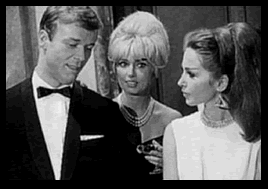 an affair with a sultry blonde, Agnes (Karin Field), who's prone to comments such as "I like you because you're always... ready." A few swinging parties later, Leslie drops her inhibitions thanks to the advances of that old '60s erotica standby, the crafty lesbian. In this case the guilty party is Irena (Sabrina Koch), a slinky man-hater who passes the time by spanking guys with her garter belt. Will Leslie still honor her engagement to Logan? Will either of them learn the meaning of fidelity? How many parties can either of them endure before they pass out?
an affair with a sultry blonde, Agnes (Karin Field), who's prone to comments such as "I like you because you're always... ready." A few swinging parties later, Leslie drops her inhibitions thanks to the advances of that old '60s erotica standby, the crafty lesbian. In this case the guilty party is Irena (Sabrina Koch), a slinky man-hater who passes the time by spanking guys with her garter belt. Will Leslie still honor her engagement to Logan? Will either of them learn the meaning of fidelity? How many parties can either of them endure before they pass out?
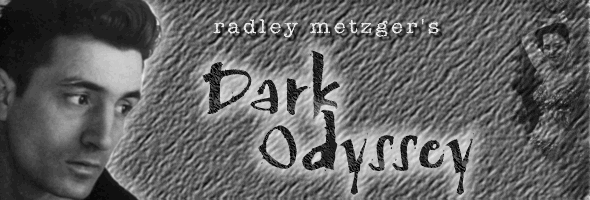
Radically different from anything else in Radley Metzger's filmography, Dark Odyssey transplants the elements of Greek tragedy into a modern American setting and reaffirms that lying beneath his impeccable skills as a stylist is an assured dramatist as well. The early score by Laurence Rosenthal, who later hit the big time in Hollywood, is a fine model of dramatic underscore with some definite traces of an Alex North influence. Extremely serious, deliberately paced, and surprisingly moving at times, Dark Odyssey reveals an early, rarely
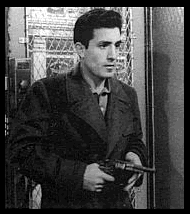 seen side of Metzger.
seen side of Metzger.
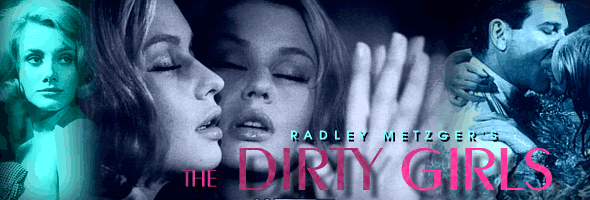
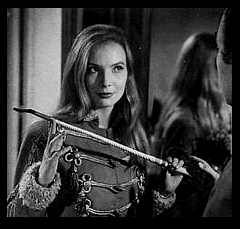 The second, Garance, cavorts through Munich looking for love in all the right places. Between the two of them, the lucky viewer gets to experience a number of forbidden delights, including some light S&M and a swimming pool orgy at which a bored millionaire dangles a piece of diamond jewelry from a fishing rod over the wet partygoers. One of the girls makes out against a mirror ("The forbidden act of self love!" as the trailer puts it), and a mild near-rape threatens to put a stop to Monique's happiness. Structurally, none of this really goes anywhere fast, but it's great fun to watch, leading to an unexpected and amusing shower stall finale that caused quite a stink in its day.
The second, Garance, cavorts through Munich looking for love in all the right places. Between the two of them, the lucky viewer gets to experience a number of forbidden delights, including some light S&M and a swimming pool orgy at which a bored millionaire dangles a piece of diamond jewelry from a fishing rod over the wet partygoers. One of the girls makes out against a mirror ("The forbidden act of self love!" as the trailer puts it), and a mild near-rape threatens to put a stop to Monique's happiness. Structurally, none of this really goes anywhere fast, but it's great fun to watch, leading to an unexpected and amusing shower stall finale that caused quite a stink in its day.
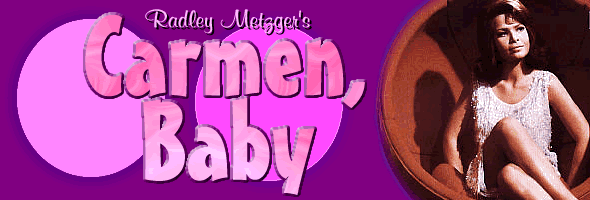
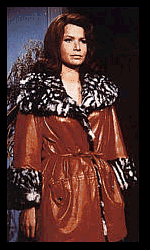 For his carelessness, Jose receives a month in jail but finds the time worth it. Smitten with Carmen, he begins to pursue her despite her wanton ways and irrational belief in astrology. In one memorable sequence (whose suggestiveness was created entirely in the editing room, according to Metzger), Carmen does a particularly dirty dance with a chianti bottle that must be seen to be believed. The two attempt to forge a relationship, but alas, Carmen refuses to be controlled, realizing she is destined for nothing but tragedy.
For his carelessness, Jose receives a month in jail but finds the time worth it. Smitten with Carmen, he begins to pursue her despite her wanton ways and irrational belief in astrology. In one memorable sequence (whose suggestiveness was created entirely in the editing room, according to Metzger), Carmen does a particularly dirty dance with a chianti bottle that must be seen to be believed. The two attempt to forge a relationship, but alas, Carmen refuses to be controlled, realizing she is destined for nothing but tragedy.
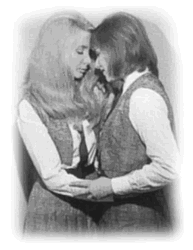
Metzger's highest profile effort at the time, Therese and
Isabelle marks perhaps the most successful attempt to fuse eroticism
with popular arthouse cinema. Utilizing an atmosphere best described as a randier Francois Truffaut, the film conjures up a melancholy girls' school
at which the suppression of emotional attachments leads our two heroines to
form a healthy, productive lesbian relationship, a rare development at the time.
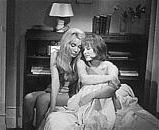 Lonely and perplexed, Therese
forges a friendship with the sultry Isabelle (Anna Gael), much to the
chagrin of those around them. The girls' progression into a self-absorbed
world to escape their surroundings (this would make a great double bill with Heavenly Creatures) eventually leads to sexual curiosity as well, though more obstacles continue to lie in their way. Boasting a first rate cast headlined by Anne Vernon (Catherine Deneuve's mother in The Umbrellas of Cherbourg) as the headmistress, Therese and Isabelle is classy entertainment on all fronts and a haunting work of visual art as well, boosted by a shimmering Georges Auric score. The actual skin quotient is surprisingly low considering the film's reputation (about
the equivalent of a soft "R" rating now), with Therese's voiceover
recollections often becoming far more explicit than anything onscreen and increasing the heat tenfold as it stimulates viewers' imaginations.
Lonely and perplexed, Therese
forges a friendship with the sultry Isabelle (Anna Gael), much to the
chagrin of those around them. The girls' progression into a self-absorbed
world to escape their surroundings (this would make a great double bill with Heavenly Creatures) eventually leads to sexual curiosity as well, though more obstacles continue to lie in their way. Boasting a first rate cast headlined by Anne Vernon (Catherine Deneuve's mother in The Umbrellas of Cherbourg) as the headmistress, Therese and Isabelle is classy entertainment on all fronts and a haunting work of visual art as well, boosted by a shimmering Georges Auric score. The actual skin quotient is surprisingly low considering the film's reputation (about
the equivalent of a soft "R" rating now), with Therese's voiceover
recollections often becoming far more explicit than anything onscreen and increasing the heat tenfold as it stimulates viewers' imaginations.